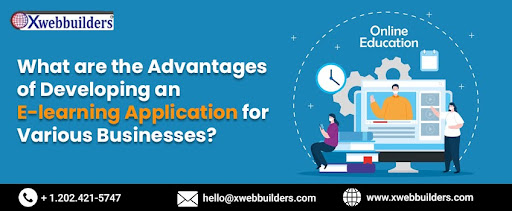
September 01, 2025

Developing an e-learning application can bring significant advantages to businesses across various industries. By leveraging technology to deliver educational content and training programs, businesses can offer flexible and accessible learning experiences to their employees, customers, or target audience. This introduction of e-learning eliminates geographical barriers and allows learners to access courses anytime and anywhere, promoting convenience and efficiency. Additionally, e-learning applications enable businesses to track and analyze learner progress, personalize learning paths, and provide interactive and engaging content. What more? Read this blog by our mobile app development company Ashburn USA to find out!
The e-learning mobile app development process offers numerous advantages for businesses across different industries. Here are some key benefits of investing in an e-learning application:
? Cost-Effectiveness: E-learning applications eliminate the need for traditional classroom-based training, which can be expensive due to travel, venue, and instructor costs. Developing an e-learning application allows businesses to deliver training and educational content at a lower cost, as it eliminates the need for physical resources and reduces overhead expenses.
? Scalability and Accessibility: E-learning applications provide scalability, allowing businesses to reach a large number of learners simultaneously. With online courses and modules, businesses can cater to a global audience, irrespective of geographical locations and time zones. Learners can access the content at their own convenience, enabling flexible learning schedules and eliminating the constraints of traditional in-person training.
? Personalized Learning Experience: E-learning applications enable businesses to deliver personalized learning experiences tailored to each learner's needs. Through user profiles, assessments, and data analytics, businesses can customize the content and learning paths to match individual preferences, knowledge levels, and learning styles. This personalization enhances engagement, knowledge retention, and overall learning outcomes.
? Consistency and Standardization: E-learning applications ensure consistent and standardized training across all learners. With predefined content and modules, businesses can deliver the same information and learning objectives to every participant, ensuring that everyone receives consistent quality education and training. This is particularly beneficial for organizations that require compliance training or certifications.
? Continuous Learning and Progress Tracking: E-learning applications facilitate continuous learning by providing access to a wide range of resources and materials. Learners can revisit content, access updated information, and engage in ongoing professional development. Additionally, businesses can track learner progress and performance through built-in analytics and reporting features. This data helps identify knowledge gaps, measure the effectiveness of training programs, and make data-driven decisions for further improvement.
? Engaging and Interactive Content: E-learning applications can incorporate various multimedia elements, such as videos, quizzes, simulations, and gamification, to create an engaging and interactive learning environment. This interactive content enhances learner engagement, motivation, and knowledge retention. It also allows businesses to present complex concepts in a visually appealing and interactive manner, making learning more enjoyable and effective.
? Rapid Deployment and Updates: E-learning applications offer the advantage of rapid deployment and easy updates. Businesses can quickly roll out new courses or training materials, ensuring that learners have access to the latest information. Updates and modifications to the content can be implemented efficiently, saving time and resources compared to traditional manual processes.
Developing an e-learning app requires careful planning and execution by a mobile app development agency. Here are the key steps to follow when developing an e-learning app:
? Define Goals and Learning Objectives: Start by identifying the goals and learning objectives of your e-learning app. Determine what skills or knowledge you want to impart to your target audience and establish clear learning outcomes.
? Conduct Market Research: Research the market to understand your target audience, competition, and industry trends. Identify the specific needs and preferences of your learners to create a compelling and relevant e-learning experience.
? Content Creation: Develop high-quality, engaging, and interactive content for your e-learning app. This may include videos, presentations, quizzes, assessments, and other multimedia elements. Ensure that the content aligns with the learning objectives and is delivered in a user-friendly format.
? Choose a Learning Management System (LMS): Select a suitable learning management system that aligns with your app's requirements. An LMS manages course administration, user registration, progress tracking, and assessment. Evaluate different LMS options and choose one that offers the features and functionality you need.
? Design User Interface and Experience: Create an intuitive and user-friendly interface for your e-learning app. Focus on ease of navigation, clear instructions, and visually appealing design elements. Consider mobile responsiveness to ensure that learners can access the app across different devices.
? Implement Gamification and Interactivity: Incorporate gamification elements, such as badges, leaderboards, and rewards, to enhance learner engagement and motivation. Include interactive features like simulations, quizzes, and discussions to promote active learning and knowledge retention.
? Enable Progress Tracking and Analytics: Integrate tracking and analytics capabilities into your e-learning app. This allows you to monitor learner progress, track completion rates, gather feedback, and generate reports. Use this data to evaluate the effectiveness of your courses and make improvements.
? Test and Debug: Conduct thorough testing of your e-learning app to ensure it functions properly across different devices and platforms. Identify and resolve any bugs or issues that may arise during the testing phase.
? Launch and Promote: Once your app is ready, launch it and promote it to your target audience. Use marketing strategies such as social media, email campaigns, and partnerships with relevant organizations to increase awareness and drive user adoption.
? Gather Feedback and Improve: Continuously gather feedback from learners and instructors to improve your e-learning app. Monitor user reviews, conduct surveys, and analyze usage data to identify areas for enhancement. Regularly update and refine your app to provide the best possible learning experience.
Professionals play a crucial role in the development of e-learning apps, ensuring that they are effective, user-friendly, and meet specific learning objectives. Here are some key roles and their responsibilities in e-learning app development:
? Instructional Designers: Instructional designers are responsible for creating the overall learning experience and instructional content. They work closely with subject matter experts to analyze learning needs, define learning objectives, and design the curriculum. Instructional designers apply instructional strategies, multimedia principles, and adult learning principles to structure the content and ensure its alignment with the target audience's needs.
? Content Developers: Content developers are responsible for creating the actual learning materials, such as text, graphics, videos, and interactive elements. They work closely with instructional designers and subject matter experts to convert complex concepts into engaging and easily understandable content. Content developers also ensure that the content is properly organized, structured, and optimized for effective learning.
? User Experience (UX) Designers: UX designers focus on creating a seamless and intuitive user experience for learners. They design the app's interface, navigation, and interactions to ensure that learners can easily access and engage with the learning materials. UX designers conduct user research, create wireframes, and conduct usability testing to ensure that the app is user-friendly and meets the needs of the target audience.
Developing an e-learning application offers numerous advantages for businesses across different industries. E-learning applications can be easily updated and scaled as per business requirements, ensuring that the content remains up-to-date and relevant. Overall, e-learning applications empower businesses to enhance employee training, improve customer education, and foster continuous learning, leading to increased productivity, engagement, and competitiveness in the market. For more information, or to avail services of our mobile app development company in Ashburn VA, visit Xwebbuilders.com .